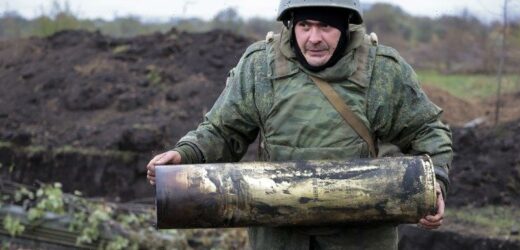China is considering sending Russia lethal military aid in the form of artillery shells as President Vladimir Putin’s army rapidly depletes its supply of ammunition a year into his invasion of Ukraine, US officials said, a prospect that has alarmed those in the Biden administration who believe Beijing has the ability to transform the war’s trajectory.
Russian artillery shells prepared to be fired at Ukrainian troops at an undisclosed location in the so-called Donetsk People’s Republic, eastern Ukraine in October.Credit:AP
There is no evidence that any weapons transfers have occurred, these officials said, speaking on the condition of anonymity to discuss the US government’s assessment.
But if China does move ahead, it would mark the first time Beijing has provided lethal aid in the conflict despite repeated warnings by the United States not to provide such support. It would also violate the spirit of a peace plan Chinese leaders proposed Friday.
The aid being contemplated consists of 122-millimetre and 152-millimetre rounds, which Russia has in dwindling supply as it prosecutes a war largely fought with artillery, the officials said.
The disclosure, first reported Friday by the Wall Street Journal, follows a public warning from Secretary of State Antony Blinken, who said last weekend that Beijing is seriously considering a provision of lethal aid. It comes, too, as Western nations grow increasingly concerned that Chinese involvement in the conflict could prove a significant setback for Ukraine and its backers.
“China has the capacity to be a game changer,” said a senior US administration official.
The Chinese Embassy in Washington did not immediately respond to a request for comment.
In response to Blinken’s warning, Chinese foreign ministry spokesman Wang Wenbin said earlier this week that China “will never accept the US pointing fingers at Sino-Russian relations or even coercing us.”
Urging the United States to “earnestly reflect on its own actions,” Wang said “it is the United States and not China that is endlessly shipping weapons to the battlefield”.
A Russian serviceman carries an artillery shell after firing at Ukrainian troops at an undisclosed location in the Donetsk region of eastern Ukraine.Credit:AP
At the moment, both Russia and Ukraine are scouring the earth for more munitions.
Moscow is appealing to North Korea and Iran to resupply 122 mm and 152 mm, both of which China also uses.
Western allies are trying to procure more 152 mm ammunition for Ukraine’s Soviet-era howitzers, as well as trying to produce more of the 155 mm NATO standard for artillery they have supplied Ukraine since the war began.
The desperate hunt is driven by the massive amount of shelling undertaken by Ukrainian and Russian forces every day – a point emphasised by NATO Secretary General Jens Stoltenberg earlier this month.
“The war in Ukraine is consuming an enormous amount of munitions and depleting allied stockpiles,” Stoltenberg said at a meeting of defence ministers in Brussels. “The current rate of Ukraine’s ammunition expenditure is many times higher than our current rate of production.”
Russia is running low on munitions, said US officials, but China, with its vaunted production capacity for long-range artillery, rocket launchers, surface-to-surface missiles and drones, could more than make up for the shortage.
That was a focal point during the meeting last week between Blinken and China’s top diplomat, Wang Yi, on the sidelines of the Munich Security Conference.
Blinken warned Wang that there would be “consequences if China provides material support to Russia or assistance with systemic sanctions evasion,” said State Department spokesman Ned Price.
Beijing so far has not provided direct military support to Russia, but US officials have accused Chinese state companies of providing nonlethal assistance in recent weeks.
“We have indications that China may be considering the provision of lethal capabilities to China,” National Security Council spokesman John Kirby said Friday, without elaborating on the specific type.
“We haven’t seen them make that decision. We haven’t seen them move in that direction. We’ve been clear both privately and publicly about our concerns with respect to that potential outcome. China should not want to become tangibly involved in that manner.”
Asked about a report in the German outlet Der Spiegel that China was negotiating over the shipment of pilotless attack drones to Russia, Kirby said “I have nothing for you on that.”
On Friday, Beijing called for a comprehensive ceasefire in conjunction with a 12-point peace plan it put forward. Blinken and Stoltenberg both reacted sceptically to the proposal – saying no solution should allow Russia to “rest” and “rearm”.
Ukrainian President Volodymyr Zelensky reacted more positively, saying he did not view it as a concrete plan but a productive gesture.
“It’s an important signal that they are preparing to take part in this theme,” he said during a news conference in Kyiv.
He emphasised, however, that Ukraine’s principal concern is that Beijing not arm Moscow.
“I very much want to believe that China will not deliver weapons to Russia, and for me this is very important,” he said. “This is point number one.”
To date, the Biden administration has committed more than $US30 billion in military assistance to Ukraine, announcing its latest package on Friday. US officials did not quantify the amount of aid that China is believed to be contemplating except to say it was, in the words of one official, “substantial.”
One of the main constraints for Russia right now is limited supply of artillery ammunition, experts said. The Russian army is “culturally an artillery army,” said Michael Kofman, a Russian military analyst at Virginia-based research group CNA.
“Over the past year, Russian forces in Ukraine leveraged their advantage in artillery to make up for a lack of manpower. But they were expending more than half a million shells per month.”
Washington Post
Most Viewed in World
From our partners
Source: Read Full Article




